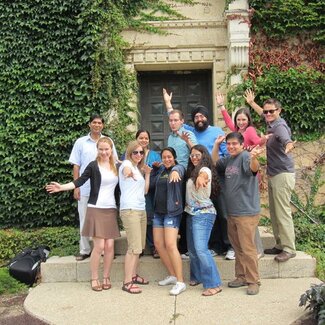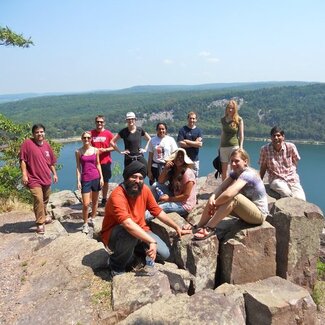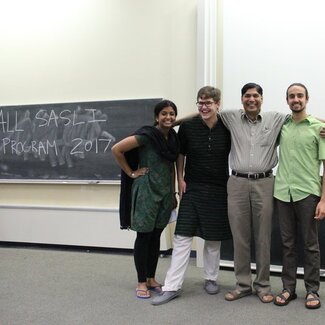Use the Course Catalog to see when courses are offered. Detailed Course Descriptions can be found below.
Same as LING 115 and REL 115. See LING 115.
Introduction to the Hindi/Urdu language; includes conversation with a native Hindi/Urdu-speaking tutor under the direction of a linguist instructor, and a minimum of formal grammar and Devanagari writing; introduction to Arabic-Persian script by arrangement. Participation in the language laboratory is required.
Second term of spoken Hindi/Urdu; includes conversation with a native Hindi/Urdu-speaking tutor under the direction of a linguist instructor, formal grammar based on conversational materials, and work on written Hindi; concentration on written Urdu by arrangement. Participation in the language laboratory is required. Prerequisite: HNDI 201.
First term of second year of the Hindi language, including drill for more advanced conversational fluency; introduction to a greater variety of styles and levels of discourse and usage; and increasing study of the written language and more formal grammar. 4 undergraduate hours. 4 graduate hours. Prerequisite: HNDI 202 or equivalent.
Concentration on ability to engage in reasonably fluent discourse in Hindi, on comprehensive knowledge of formal grammar, and on ability to read ordinary texts in Hindi. 4 undergraduate hours. 4 graduate hours. Prerequisite: HNDI 403 or equivalent.
Course for advanced knowledge of spoken and written Hindi. Participation in the language laboratory is required. 3 undergraduate hours. 3 graduate hours. Prerequisite: HNDI 404 or consent of instructor.
Course for advanced knowledge of spoken and written Hindi with emphasis on modern Hindi literature and language. Participation in the language laboratory is required. 3 undergraduate hours. 3 graduate hours. Prerequisite: HNDI 405 or consent of instructor.
Introduces selected literatures of South Asia in a cross-cultural and comparative perspective: emphasizes relating literary texts and trends to the historical, sociocultural, political, and literary contexts of the subcontinent. Texts for South Asian languages are offered in English translation; in addition, there will be texts by South Asian authors written in English. Knowledge of a South Asian language not required. 3 undergraduate hours. 3 graduate hours. Prerequisite: Consent of course coordinator.
Study and analysis of Business Hindi in a wide variety of contexts and settings (from Metropolitan to rural). 3 undergraduate hours. 3 graduate hours. Prerequisite: HNDI 403 or higher or consent of instructor.
HNDI 201 (Fall Semester only) is the beginner's level Hindi course. The aim of the course is to enable the student to acquire the major language skills - speaking, listening, reading and writing in Hindi. Standard text materials, course packet prepared by the Instructor (s), and instructional and authentic materials available on internet are used with equal emphasis on spoken and written Hindi. The structure and conversations will be presented in a variety of authentic contexts of Hindi. Training in spoken Hindi emphasizes speaking and listening at normal speed with near-native pronunciation and intonation.
IMPORTANT: Students with prior knowledge of Hindi are strongly encouraged and advised to take either HNDI 403, HNDI 404, HNDI 405, HNDI 406, or HNDI 412 (see the Hindi Program Director for help in placing into an appropriate level class or for fulfilling the language requirement through the Proficiency Exam).
The major objectives of this course are: (a) to train students to contextualize their grammar skills which they have acquired in their first two semesters of instruction (i.e., students will be required and encouraged to use the grammatical patterns learnt in both spoken and written contexts with ease, accuracy, and fluency), (b) to introduce students to the higher level of the structural complexity of Hindi so that they can develop competence in the comprehension of Hindi texts selected from a variety of genres, (c) to familiarize students with important socio-cultural conventions and practices which are vital both for internalizing language skills and for successfully participating in interpersonal communicative events, and, (d) to train and encourage students to think in Hindi through creative writing. At the end of the instructional period, students are expected to develop competence in comprehension of simple literary texts, carry out conversations in various social situations, and express their views on topics of interest in contemporary standard Hindi idiom.
The course will introduce students to authentic texts (short stories, essays, poems, satirical writing, etc.) and discourse structures of Modern Standard Hindi and occasionally of medieval Hindi. The course will also focus on the idiomatic structures, linguistic patterns and uses of Hindi in a broad variety of registers and styles, especially the language of contemporary (post globalization) films, popular television shows, and print media. The course will help students acquire knowledge of some of the most productive processes of word formation in Hindi, and special vocabulary items pertinent to various genres. Students will be encouraged to study Hindi texts related to their own preferred genre or disciplines (such as History, Political Science, Anthropology, Cultural Studies, Religion, Science, Film Studies, International Relations and Diplomacy, Agriculture, Medicine, Mass Media, Communications, Economics, Business and Management, etc.) for the course requirements (powerpoint presentations and papers).
The globalization of the world economy and the newly emerged (and emerging) market economy of India has witnessed a greater use of Hindi in the Indian business world. Although, English still plays a dominant role in the inter-institutional contexts, Hindi is being used by the North Indian neo-literates in continuously expanding business contexts (in banking, railways, agribusiness, household products, medicines and medical tools, computer hardware and software etc.). Not surprisingly, practically all multinational financial institutions operating in India regularly advertise their products and services in Hindi in Hindi newspapers and on Hindi TV programs. The Business Hindi course will map, illustrate and discuss the linguistic contours of the business Hindi lexicon (created by governmental and semi-governmental institutions, print media, and TV) in a wide variety of its uses in transactional, economic, ethical and iconic/branding contexts. This course is a ground breaking study and analysis of Business Hindi in a wide variety of contexts and settings (from Metropolitan to rural). The course is very different from other business language courses, such as Business French or Business Spanish, in the uniqueness of the subject of study – the historical, political, economic, business contexts of French and Spanish is very dissimilar to that of Hindi. Secondly, the agencies and agents responsible for creating and (constantly) expanding the Business Hindi lexicon are simultaneously borrowings words and concepts from both Sanskrit and English. Finally, whereas a European business language is used in established markets of both developed and developing economies, Hindi is being used in the emerging/newly emergent market of a developing economy
HNDI 202 (Spring Semester only) is a continuation course of HNDI 201. In this course, students continue to develop basic language skills (listening, speaking, reading, and writing) while becoming familiar with the aspects of the cultural contexts and common discourse patterns of Hindi-Urdu. The course is designed to make students competent in appropriately using the basic structures and vocabulary of Hindi-Urdu in all basic social situations. Students are introduced to different varieties of Hindi through films and online textual and audio-visual material.
IMPORTANT: Students with prior knowledge of Hindi are strongly encouraged and advised to take either HNDI 403, HNDI 404, HNDI 405, HNDI 406, or HNDI 412 (see the Hindi Program Director for help in placing into an appropriate level class or for fulfilling the language requirement through the Proficiency Exam).
The major objectives of this course are: (a) to train students to contextualize their grammar skills which they have acquired in their first two semesters of instruction (i.e., students will be required and encouraged to use the grammatical patterns learnt in both spoken and written contexts with ease, accuracy, and fluency), (b) to introduce students to the higher level of the structural complexity of Hindi so that they can develop competence in the comprehension of Hindi texts selected from a variety of genres, (c) to familiarize students with important socio-cultural conventions and practices which are vital both for internalizing language skills and for successfully participating in interpersonal communicative events, and, (d) to train and encourage students to think in Hindi through creative writing. At the end of the instructional period, students are expected to develop competence in comprehension of simple literary texts, carry out conversations in various social situations, and express their views on topics of interest in contemporary standard Hindi idiom.
The course will introduce students to authentic texts (short stories, essays, poems, satirical writing, etc.) and discourse structures of Modern Standard Hindi and occasionally of medieval Hindi. The course will also focus on the idiomatic structures, linguistic patterns and uses of Hindi in a broad variety of registers and styles, especially the language of contemporary (post globalization) films, popular television shows, and print media. The course will help students acquire knowledge of some of the most productive processes of word formation in Hindi, and special vocabulary items pertinent to various genres. Students will be encouraged to study Hindi texts related to their own preferred genre or disciplines (such as History, Political Science, Anthropology, Cultural Studies, Religion, Science, Film Studies, International Relations and Diplomacy, Agriculture, Medicine, Mass Media, Communications, Economics, Business and Management, etc.) for the course requirements (powerpoint presentations and papers).


